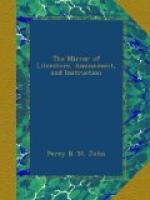Shakspeare, in his Macbeth, thus describes this royal, but now exploded gift:—
“Strangely
visited people,
All swollen and ulcerous, pitiful to the
eye,
The mere despair of surgery, he cures—
Hanging a golden stamp about their necks,
Put on with holy prayers.”
In Nicholls’s Literary Anecdotes of the Eighteenth Century, vol. ii. p. 495, 505, many curious particulars relating to this ceremony are to be found.
As the custom has now for some time been discontinued, and the credulity of those who believed in its efficacy, laughed at, I hope it will not be long ere that disgusting custom of allowing persons (of whom women in general form by far the greater number) afflicted with the king’s evil, and different other disorders, to come on the scaffold immediately after the execution of a criminal, for the purpose of touching the part affected, with the hand of the but just dead malefactor, will be put a stop to; it being the very height of absurdity to imagine that it can be productive of any good effect; but on the contrary, tending to divest the minds of the surrounding multitude of that awe with which the ignominious spectacle should impress them.
[Greek: S.G.]
In the trifling paper I sent you respecting “Cats,” which you deemed worthy of insertion in No. 398, you have it “by some merchants from the Island of Cyprus, who came hither for fur,” it should be tin—Fur being an article of importation.
* * * * *
BOOKSELLERS’ MARKS OR SIGNS.
(For the Mirror.)
Many books, especially those printed in the 17th century, have no other designation either of printer, bookseller, or even city, but merely marks or signs. The anchor is the mark of Raphelengius, at Leyden; and the same with a dolphin twisted round it, of the Mantuii, at Venice and Rome; the Arion denotes a book printed by Oporrinus, at Basil; the caduceus, or pegasus, by the Wechelliuses, at Paris and Frankfort; the cranes, by Cramoisy; the compass, by Plantin, at Antwerp; the fountain, by Vascosan, at Paris; the sphere in a balance, by Janson, or Blaew, at Amsterdam; the lily, by the Juntas, at Venice, Florence, Lyons, and Rome; the mulberry-tree, by Morel, at Paris; the olive-tree, by the Stephenses, at Paris and Geneva, and the Elzevirs, at Amsterdam and Leyden; the bird between two serpents, by the Frobeniuses, at Basil; the truth, by the Commelins, at Heidelberg and Paris; the Saturn, by Collinaeus; the printing press, by Badius Ascensius, &c.
P.T.W.
* * * * *
THE NATURALIST.
* * * * *
DIFFERENT COLOURS OF THE EGGS OF BIRDS.




